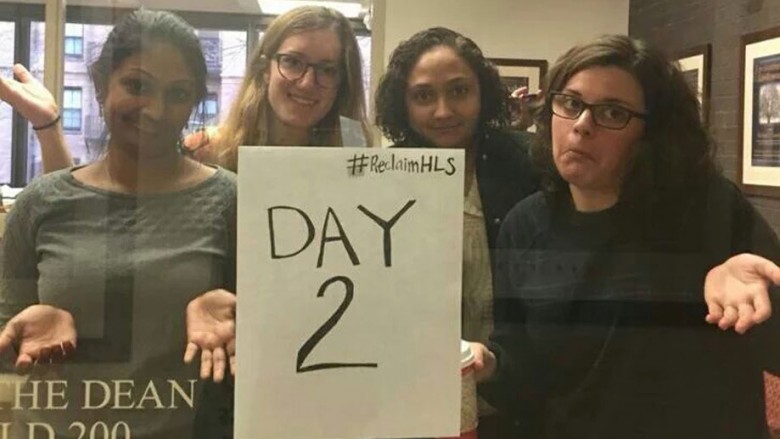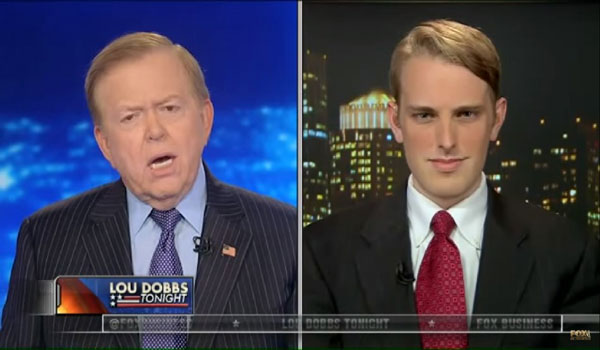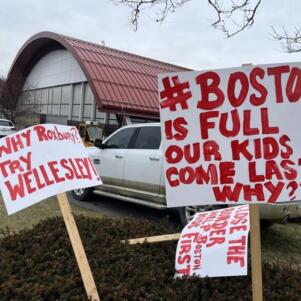Amid activism, some Harvard Law students feel silenced
By Evan Lips | December 14, 2015, 6:26 EST
 In December 2016, Harvard Law School student activists look to talk to Dean Martha Minow. (Courtesy of Twitter)
In December 2016, Harvard Law School student activists look to talk to Dean Martha Minow. (Courtesy of Twitter) CAMBRIDGE — Bill Barlow, a third year student at Harvard Law School, won’t shy away from challenging student activists who are demanding the school erase any references to its slaveholding founder and insisting that students be forced to take classes taught from the Critical Race perspective.
Yet Barlow, who is white and grew up north of Los Angeles, is unique in the sense that he’s the only student to publicly question recent demands by student activists.
“A lot of students don’t agree with the protesters,” Barlow said during a recent interview. “But they feel like they can’t speak their minds, and that’s becoming a problem here.”
It became a problem for Barlow last month when he was invited to appear on the Fox Business Channel. Lou Dobbs interviewed Barlow in early November about an op-ed he published in the student-run Harvard Law Record. In the piece,“Fascism at Yale,” Barlow criticized students at Yale University who demanded the firings of two administrators who questioned whether regulating what can and can’t be worn for Halloween constituted a free speech violation.
“This recent movement of university students to use administrative procedures to punish speech with which they disagree should be called by its rightful name: proto-fascism,” Barlow wrote.
An easy target
Predictably, Barlow’s column generated some buzz and a range of reactions. But it was not until he went on television to defend his views that reactions became heated.
“This is literally the most punchable face I’ve ever seen,” someone wrote in a Facebook post with the Dobbs interview. “He looks like a political cartoon character of what somebody with those beliefs looks like.”
Others compared Barlow’s appearance to a movie villain. Some went further.
“He’s kinda the ‘creepy white male who knows he’s gonna rule the world/serial killer’ sort,” one user posted.
Barlow uploaded screenshots of them to accompany his latest op-ed, titled “The Sound of Silence.”
Based upon the comments Barlow saved, the fiercest opposition was not generated by what he said — instead it was driven by what he looks like. Barlow, who is white and is a member of the Mormon Church, has blond hair and blue eyes. He dressed appropriately for his television appearance, donning a suit and a red tie.
Barlow said his biggest concern is that those who may disagree with the student activists and may feel inclined to offer counter viewpoints are now too afraid of the potential backlash.
“My roommate is the editor for the Law Record and he told me last night there were two who came to him asking to write articles about the protest, and to express their views in a dissenting fashion, but both of them pulled out and basically said it wasn’t worth it,” said Barlow.
The editor
Barlow’s roommate, fellow third year student Michael Shammas, recently helped launch a new Law Record op-ed series named #HLSUntaped, referring to a Nov. 19 incident in which portraits of black professors in Wasserstein Hall were found taped over with black tape. Campus police are treating the incident as a hate crime.
Shammas, who said Wednesday he thinks the movement has sparked a valuable discussion about race and added that he believes there are “entrenched racial problems” on campus, wrote a column defending his decision to publish Barlow’s op-eds.
Shammas noted in his op-ed that one student called him a bigot for publishing conservative articles and argued that “if it were not for (Shammas’s) white male privilege, I would recognize that censoring articles is the legitimate way to go.”
“My role is editor-in-chief,” Shammas wrote. “Not thought-policeman-in-chief.”
Shammas also confirmed that several students told him privately that they wanted to write op-eds “dissenting from specific demands they believe limit academic freedom” or columns opposing “what they see as a tendency of some activists to pigeonhole and ‘essentialize’ them for being white rather than simply asking them to acknowledge white privilege.”
Shammas added that the only conservative student who submitted an op-ed was Barlow.
“This isn’t surprising,” Shammas said. “I think most activists would agree that a lot of students, particularly white conservative ones, are refraining from this discussion because they think it’s more trouble than it’s worth to get involved.”
Shammas said he thinks one reason dissenting students remain silent is a fear that some will stigmatize their dissent by characterizing any disagreement as illegitimate, labeling the dissenting view a “microaggression” or suggesting that dissent “can only come from white privilege.”
“I actually think some of the blame for remaining silent lies with the students themselves,” Shammas said. “So what if someone calls you names? The best way to grow is by engaging with others.”
The silent
Joshua Craddock, a first year law student, said he knows a lot of students who are just trying to get through the semester.
“I’m just focusing on school,” he said earlier this week. “But I am watching closely.”
Craddock said he thinks the list of demands presented by the activists is problematic.
“They offered mechanistic solutions to a series of moral problems,” Craddock said. “That isn’t going to solve anything. You have to have access to a transcendent belief in truth and reality, and it’s unfortunate at Harvard, where our motto is veritas — meaning truth — yet here there’s more moral relativism and less truth.
“So how do you have access to answers to a moral problem like this when there is no such thing as truth? I think building character and moral development is the answer.”
The tape
Craddock said he remembers the initial protests in October, when about 25 students participated in a protest aimed at convincing administrators to change a portion of the law school’s seal featuring sheaves of wheat, the crest of the Royall family. Isaac Royall Jr., who donated money creating the school’s first professorship and is credited with founding the school, also happens to hail from a slaveholding family.
Craddock said he felt the movement, which lit up student social media accounts via the Twitter hashtag #RoyallMustFall, was beginning to lose traction in mid-November.
“It was boiling on the back burner before the tape incident, but once that happened, it got thrown into the limelight,” Craddock added.
The next morning law school student Derecka Purnell snapped photos of the defaced portraits and posted them to her social media account.
“So much hate. So early,” Purnell posted at 8:31 a.m. on Nov. 19.
The demands
The incident propelled some student activists like Purnell into the limelight, appearing on MSNBC or other television news outlets. It also prompted Dean Martha Minow to announce a committee to help determine whether the Royall family crest has a future at the law school.
On Friday, Dec. 4, student activists submitted a list of demands to Minow. Among other things, activists demanded the school offer additional financial aid to minorities, create a new office of diversity and inclusion and revamp course requirements to include classes covering racism, white supremacy and imperialism.
The students set a 9:30 a.m. deadline for Monday, Dec. 7. In the meantime, the school held a discussion that Friday afternoon. Scores of students, faculty and several administrators, including Minow, attended the talks. According to a website launched by a group calling itself the Coalition for Racial Justice at Harvard Law School, which recorded the meeting and posted audio clips online, there were 24 who spoke.
The only dissenting voice was Barlow’s, who said the school now boasts an environment “which encourages and rewards people who express their anger and outrage” rather than one that offers solutions.
“That is an unhealthy environment,” he added.
A “responsible” blog
An idea that’s been brewing in Barlow’s mind is to create a blog where students who may have a different viewpoint can freely and anonymously post their thoughts, but with one caveat — the blog will feature “a degree of respectability.”
“I’m willing to put my name on the blog,” Barlow said. “There will be someone who people can hold responsible for what’s written. There will be rules so it doesn’t devolve into ad-hominem attacks. But most of all it will allow people to express themselves.”
Barlow’s reference to “ad-hominem attacks” is also a reference to a blog that popped up which alleges that the taping incident was perpetrated by the activists themselves in order to draw attention to their mission. The website, titled “Royall Asses,” criticizes three of the most prominent activists. Barlow said he disapproves and described it as a form of bullying.
He say he wants to find a way to create a place where civil discourse is encourage.
“Our hope is to create a forum where people can feel like they can at least — anonymously — say what they like like they are unable to say openly,” said Barlow.
Contact Evan Lips at [email protected] or on Twitter at @evanmlips.












